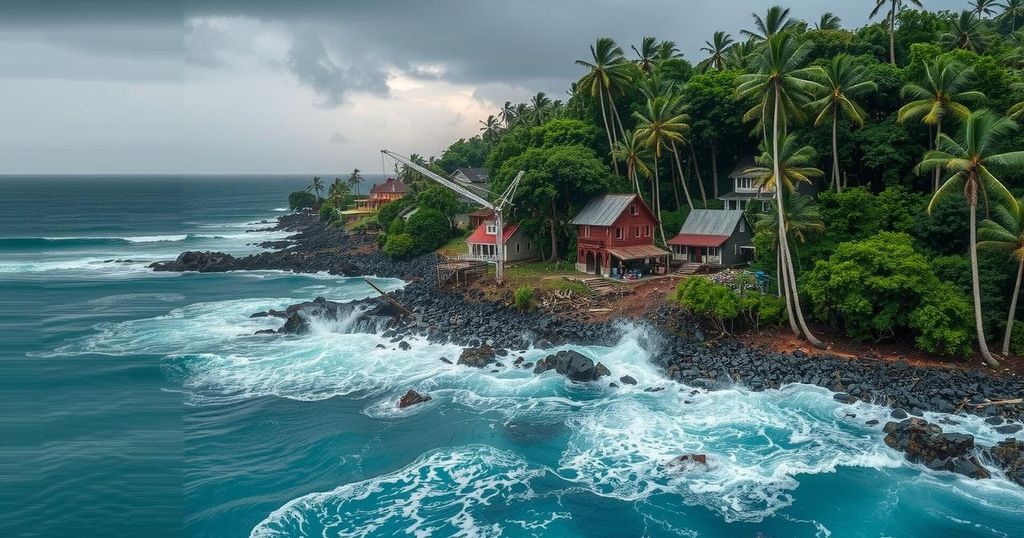Mayotte faces a fresh crisis as it grapples with Tropical Storm Dikeledi, just weeks after Cyclone Chido caused extensive devastation, resulting in numerous deaths and missing persons. A red alert has been issued for flooding and landslides, prompting authorities to take urgent measures for public safety, including the establishment of cyclone shelters and the mobilization of emergency services.
Mayotte has been struck by another tropical storm, Dikeledi, only weeks after the catastrophic impact of Cyclone Chido, which occurred on 14 December and resulted in at least 39 fatalities and over 200 individuals reported missing. The fresh storm has prompted authorities to issue a red alert, indicating a high risk of flooding and landslides throughout the islands. This warning urges residents to remain indoors or seek safe shelter as heavy rains and strong winds are expected, despite the storm’s center passing approximately 100 kilometers south of the islands.
The ongoing crisis has exacerbated the devastation following Cyclone Chido, as recovery efforts had just begun. Reports indicate areas such as the southern village of Mbouini, previously relatively untouched by Chido, experienced serious flooding due to Dikeledi. Critical infrastructure impacts are apparent, with Mayotte’s international airport closed and cyclone shelters established in schools and community centers to assist displaced residents.
Emergency personnel and military forces have been mobilized to mitigate the effects of Dikeledi, focusing resources on communities around the capital, Mamoudzou, which faced severe destruction from the earlier cyclone. French officials, led by Prime Minister François Bayrou, have expressed concerns that the death toll from Chido could rise significantly, as many victims were undocumented migrants and the rapid burial practices of the local Muslim community complicate accurate reporting of casualties.
In light of these repeated calamities affecting the islands, the French government has faced criticism over its response, with residents expressing their frustrations during governmental visits. The precarious situation in Mayotte underscores the ongoing challenges posed by natural disasters, particularly in a region that is recognized as the poorest in the European Union.
The archipelago of Mayotte, located in the Indian Ocean between Madagascar and Mozambique, has been severely impacted by two significant weather events in a short span. Cyclone Chido, which struck on December 14, was categorized as the worst cyclone in Mayotte in nearly a century. The aftermath of this disaster saw substantial loss of life and infrastructure damage, prompting recovery efforts that were abruptly interrupted by the arrival of Tropical Storm Dikeledi. The region’s vulnerability to severe weather events is compounded by socio-economic issues, making recovery efforts challenging.
In conclusion, Mayotte’s recent experiences with devastating tropical storms highlight the urgency for effective disaster management and resilience-building strategies. The immediate effects of Tropical Storm Dikeledi present new obstacles to recovery from Cyclone Chido. Government and local authorities must address both the humanitarian and infrastructural needs resulting from this dual crisis, ensuring that the voices and conditions of affected populations are considered in future disaster responses.
Original Source: news.sky.com






